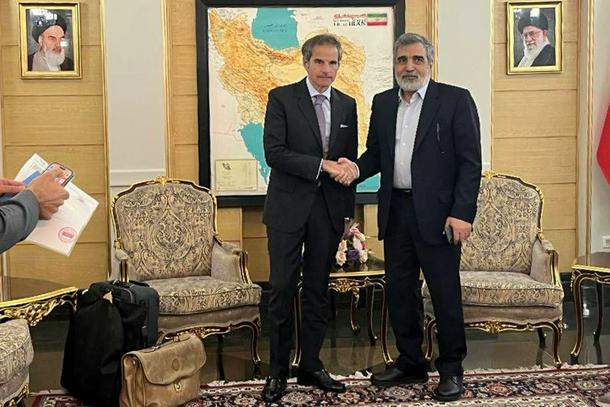
An Iranian Atomic Energy Organization picture shows IAEA chief Rafael Grossi (L) with IAEO spokesman Behrouz Kamalvandi in Tehran
Tehran (AFP) - The UN nuclear watchdog’s chief Rafael Grossi warned that Iran was “not far” from possessing a nuclear bomb, shortly before he arrived in Tehran on Wednesday for talks.
Western countries including the United States have long accused Iran of seeking to acquire nuclear weapons – an allegation Tehran has consistently denied, insisting that its programme is for peaceful civilian purposes.
“It’s like a puzzle. They have the pieces, and one day they could eventually put them together,” Grossi told French newspaper Le Monde in an interview published on Wednesday.
“There’s still a way to go before they get there. But they’re not far off, that has to be acknowledged,” he said.
The International Atomic Energy Agency watchdog was tasked with overseeing Iran’s nuclear programme and its compliance with a 2015 nuclear deal which collapsed three years later when the United States withdrew from it during President Donald Trump’s first term.
“It’s not enough to tell the international community ‘we don’t have nuclear weapons’ for them to believe you. We need to be able to verify,” said IAEA chief Grossi.
He arrived in Tehran on Wednesday and met Foreign Minister Abbas Araghchi, who posted on X that the pair had had a “useful discussion”.
Araghchi called on the IAEA boss to “keep the agency away from politics” in the face of “spoilers” vying to “derail current negotiations”.
Grossi posted ahead of the meeting that Tehran’s cooperation with the IAEA was “indispensable to provide credible assurances about the peaceful nature of Iran’s nuclear programme at a time when diplomacy is urgently needed”.
Grossi was also expected to meet Mohammad Eslami, who heads Iran’s nuclear energy agency.
- ‘Maximum pressure’ -
Grossi’s visit comes ahead of a second round of talks between Iran and the United States on Saturday, a week after the two countries held their highest-level talks since Trump abandoned the nuclear deal in 2018.
Both Tehran and Washington called the first meeting “constructive”.
Earlier, Araghchi said Iran’s enrichment of uranium was not up for discussion, after US Middle East envoy Steve Witkoff called for it to end.
“We are ready to build confidence in response to possible concerns, but the issue of enrichment is non-negotiable,” he told reporters.
His remarks came after Witkoff said Tuesday that Iran must “stop and eliminate” enriching uranium as part of any nuclear deal.
The day before, Witkoff had urged only that Iran return to the 3.67 percent enrichment ceiling set by its 2015 accord with major powers.
In its latest report, the IAEA said Iran had an estimated 274.8 kilogrammes (605 pounds) of uranium enriched to up to 60 percent.
That level far exceeds the ceiling set by the 2015 deal, but still falls short of the 90 percent threshold required for a nuclear warhead.
After returning to office in January, Trump reimposed sweeping sanctions against Iran under his “maximum pressure” policy.
In March, he wrote to Iran’s supreme leader Ayatollah Ali Khamenei, urging talks but also warning of possible military action if these fail to produce a deal.
- ‘Conflicting positions’ -
Ahead of Saturday’s new round of talks, Araghchi condemned what he called the Trump administration’s “contradictory and conflicting positions”.
“We will find out the true opinions of the Americans during the negotiation session,” he said.
Araghchi said he hoped to start negotiations on the framework of a possible agreement, but that this required “constructive positions” from the United States.
“If we continue to (hear) contradictory and conflicting positions, we are going to have problems,” he warned.
On Wednesday, Iranian state media said Saturday’s talks would be held in Rome with Omani mediation, as an Italian spokesman also confirmed the location.
Iran’s deputy foreign minister, Kazem Gharibabadi, affirmed to state television late Wednesday that the talks would be held in Rome.
He also noted that Iran’s request is that “if the other party is serious about the negotiations, they should come with logical requests, not unrealistic ones,” referring to Witkoff’s enrichment remarks.
Araghchi is set to head to Iran’s ally Russia on Thursday, said Kazem Jalili, Tehran’s ambassador in Moscow.
Iran has said the visit was “pre-planned”, but will include discussions on the Iran-US talks.
Ahead of Saturday’s talks, Iranian President Masoud Pezeshkian said he hoped a deal could be reached with the United States, the official IRNA news agency reported.